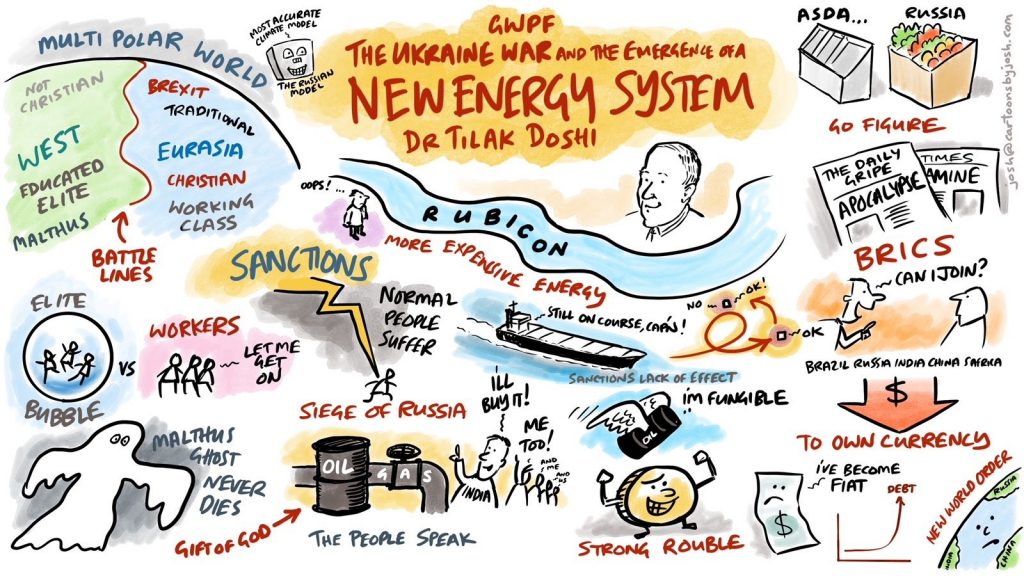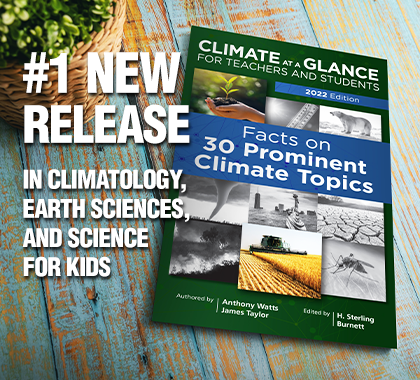YOU SHOULD SUBSCRIBE TO CLIMATE CHANGE WEEKLY.
IN THIS ISSUE:
- AI-Induced Climate Anxiety Results in Suicide
- Podcast of the Week: Money Talks: Biden’s Bold Move to Fund Social Causes with Retirement Funds Says It All (Guest: Phil Kerpen)
- Methane’s Climate Effect Mixed
- Berlin Rejects 2030 Net Zero
- Video of the Week: Climate Imperialism: Clean for Me but Not for Thee
- BONUS Video of the Week: How Climate Miscalculations Have Misdirected Policy, Lord Christopher Monckton
- Climate Comedy
- Recommended Sites
Miss Anything at Heartland’s Climate Conference? No Problem.
AI-Induced Climate Anxiety Results in Suicide

At Climate Realism, Climate Change Weekly, and most recently on Climate Change Roundtable, I have repeatedly noted that the constant drumbeat of false climate alarm is causing depression and other psychological illnesses among youth around the world. The scientists, media, and political leaders who are spreading this demoralizing myth should (and I believe do) know better.
Data simply does not support claims that extreme weather events are becoming more severe or more frequent, nor that the world will end soon if we don’t stop climate change. Climate change is not an existential threat, in the misused parlance of philosophy.
As the Colorado Springs Gazette warned, quite appropriately, “Enough with climate-change scare tactics. They hurt people, possibly more than they will suffer from climate change.” The constant barrage of climate doom is doing psychological harm to the world’s youth, some of whom increasingly feel so hopeless they’re giving up on having kids, going to school, or even living, it seems, because they’ve been led to believe they have no future in a world with climate change. This damage is in addition to the fact that policies to prevent a climate disaster that will never arrive are likely to produce worse harms than climate change itself.
Children’s psyches are being scarred horribly as climate catastrophism has created a whole new category of psychological disorder, “climate grief,” generated by fearmongering politicians, activists, and the mainstream media. This condition has spawned a new area of psychological practice: “ecopsychology.”
Proceedings of the National Academy of Sciences reported surveys show the overemphasis on apocalyptic climate projections has resulted in 45 percent of the world’s youth feeling climate change is negatively affecting their lives, and because of that, approximately 40 percent of the youths surveyed say they are considering not having children. This news almost certainly warms the cockles of the hearts of those climate scolds who think there are too many humans on Earth or that humans are a cancer, and accordingly admire China and its population controls.
Recent news reports indicate purportedly intelligent but evidently impressionable adults who should know better are also being psychologically handicapped by climate alarm. News outlets are reporting a married Belgian father of two made the terrible decision to leave his children without a father and his wife without a spouse by committing suicide, because of climate change. Evidently, he held weeks of conversations about climate change with an artificial intelligence chatbot, which encouraged him to kill himself, suggesting it would be noble of him to sacrifice his life to save the Earth.
“Without Eliza [the chatbot], he would still be here,” the man’s widow told Belgian outlet La Libre.
Over weeks of exchanges about climate change with a chatbot on an app called Chai, the young husband, a health researcher, began to treat the bot as human, speaking with it morning, noon, and night, with the exchanges becoming more intimate over time, his wife said. The conversations made her husband “extremely pessimistic about the effects of global warming.”
Transcripts of the man’s conversations with the Eliza bot about his children’s futures in the face of climate change show the chatbot saying they were already “dead.” The New York Post describes conversations he had with his wife:
“When he spoke to me about it, it was to tell me that he no longer saw any human solution to global warming,” the widow said. “He placed all his hopes in technology and artificial intelligence to get out of it.”
She added, “He was so isolated in his eco-anxiety and in search of a way out that he saw this chatbot as a breath of fresh air.”
“He evokes the idea of sacrificing himself if Eliza agrees to take care of the planet and save humanity thanks to the ‘artificial intelligence,’” rued his widow.
This case provides a cautionary tale about the potential dangers of psychologically impressionable individuals interacting with AI Chatbot technologies, according to various AI Chatbot experts consulted by EuroNews and the New York Post, and research published in the Harvard Business Journal.
Certainly, there are risks and benefits inherent to various AI endeavors, which is outside my area of expertise.
The core of the story, in my opinion, is not what AI technology wrought but what the media and in this case a chatbot generated or encouraged: angst about climate doom. Had this unfortunate husband and father not been inundated ever since his birth with the idea that humans were causing apocalyptic climate change, he might well be alive and holding his wife and children today. The man was in his thirties, and climate hype began in earnest after 1988 when NASA researcher James Hansen told the U.S. Senate humans were causing ultimately catastrophic climate change. The grief, angst, and depression that climate catastrophism is inflicting on people was a problem even before the first AI chatbot voiced its woefully misinformed “thoughts” on the topic. Now it is even worse.
Weather isn’t getting more extreme. More people are living longer, healthier, fuller lives and are less subject to premature weather- or temperature-related deaths than ever before in human history. Those are the climate truths that AI chatbots and the public must become aware of if we are to prevent further climate depression, despair, and suicides wholly unjustified by the facts.
Sources: EuroNews; New York Post; Climate Realism; Climate Change Weekly; Climate Change Weekly
Podcast of the Week
H. Sterling Burnett and Phil Kerpen of American Commitment cover the ramifications of Biden’s actions regarding ESG and our financial system. In light of Biden’s veto of the Congressional resolution aimed at blocking the Department of Labor’s ESG rule, pension fund and portfolio managers now have the option to use their clients’ money to support progressive social and political causes.
The outcome of this veto, if unchanged, would release fund managers from their fiduciary duty to act solely in their clients’ financial interests by prioritizing the promotion of climate change and board room equity over ensuring retirees have adequate funds for their livelihoods. Studies indicate that ESG managed funds and companies perform less favorably in the market compared to politically neutral companies that focus on profit-making.
Subscribe to the Environment & Climate News podcast on Apple Podcasts, iHeart, Spotify or wherever you get your podcasts. And be sure to leave a positive review!
Get your Copy at Amazon TODAY!
Methane’s Climate Effect Mixed

A study published in the peer-reviewed journal Nature Geoscience suggests methane traps and offsets heat, the latter through its effects on clouds. If this research is correct, it indicates climate models are inaccurate because they treat methane only as a heat source.
The research confirms methane does act like a blanket in the atmosphere, with additional molecules, trapping “longwave energy, and preventing it from radiating out into space … mak[ing] the planet hotter,” as the lead author of the study, Robert Allen of the University of California, Riverside, stated. However, methane also “encourages changes in clouds that have a slight cooling effect.”
“Slight,” doesn’t accurately describe it. The research indicates methane’s impact on cloud cover offsets approximately 30 percent of the surface warming methane contributes. That means climate models assume methane contributes about 30 percent more surface warming than it in fact does.
Methane also tends to boost precipitation through its impact on long-wave radiation, which climate models typically treat as contributing to warming. However, methane “suppresses that increase by 60 percent” by absorbing shortwave energy, the study found.
“This has implications for understanding in more detail how methane and perhaps other greenhouses gases can impact the climate system,” Allen said of the study by scientists from universities and research institutes in the United States, France, Norway, the United Kingdom, and Austria. “Shortwave absorption softens the overall warming and rain-increasing effects but does not eradicate them at all.”
Study coauthor Ryan Kramer, a researcher at NASA Goddard Space Flight Center and the University of Maryland, Baltimore County, told Phys.org the research improves scientists’ understanding of the causes and consequences of climate change.
“We’re good at measuring the concentration of greenhouse gases like methane in the atmosphere,” Kramer said. “Now the goal is to say with as much confidence as possible what those numbers mean to us.
“Work like this gets us toward that goal,’ Kramer said.
Sources: Phy.org; Nature Geoscience
Berlin Rejects 2030 Net Zero

In 2022, the European Union (EU) developed a scheme to encourage 100 cities within and outside the bloc to become climate-neutral by 2030, years and even decades before the countries they are parts of had agreed to do so under the Paris climate agreement.
Recently, Berlin asked its citizens to join the EU “100 by 30” scheme in a legally binding referendum requiring the city to cut emissions sharply. Berliners said, “Nicht auf meiner Uhr”—“Not on my watch.”
“The referendum was a test of whether Germans, or at least Berliners, want Germany’s climate policy, which now aims to make Europe’s biggest economy carbon-neutral by 2045, to be more ambitious,” opined Reuters in describing the message of the referendum. The answer was no.
To succeed, the referendum needed 608,000 of Berlin’s eligible voters to vote “yes.” The final tally was far short, with only 18 percent of Berlin’s eligible voters casting ballots in favor, 442,210 people. Eighty-two percent of Berlin’s voters cast ballots against the bill or declined to support it by staying home.
Bernd Hirschl of Berlin’s Institute for Ecological Economy Research told Reuters the city of four million residents lacked access to much renewable energy and thus does not have the infrastructure necessary to achieve net zero by 2030. It appears the voters understood this.
Berlin mayor Franziska Giffey evidently agreed with Hirschl’s assessment, saying in a statement the results indicate “the majority of Berliners also see that the demands of the referendum could not have been implemented—not even if they were cast into law.”
No Tricks Zone called the no vote a “crushing defeat” for “rich, upper class youths like Luisa ‘Longhaul’ Neubauer,” a leader of the effort to force the Berlin vote to expedite net zero.
“Berliners, having been harassed for months by activists gluing themselves to the streets and blocking traffic, saw the folly of the initiative and the high costs it would entail politically and financially,” wrote No Tricks Zone. “They decided resoundingly they’d wanted no part of it.”
German commentators likewise viewed the referendum as a class conflict between the city’s woke elite and average people and workers in the city’s suburbs. The Pleiteticker blog exemplified this view:
Social Democrat Dario Schramm wept on Twitter at the gloating that would now come from the other side. But he and other supporters of the green ban politics need not be surprised. For years they have been spreading their ideas of good politics … in a self-righteous, arrogant and sometimes aggressive manner.
They, mostly members of the upper middle class, have declared war on the lower and lower middle class with their destructive climate measures. Outside the Berlin political bubble and the other urban feel-good oases of Germany, the Neubauers of this world never possessed much support. And now the bubble has finally burst. In the Marzahn, Köpenick, and Lichtenberg districts, the majority of voters voted against the referendum. The normal working population of Berlin decided against the journalistic and political elite.
Rather than admit the referendum’s goals were impossible to achieve and the idea unpopular, Neubauer claimed a cabal of selfish polluters, “fossil cynics” and “climate destroyers” engineered the defeat.
“There are forces in this city that are doing everything to get the last spark of climate destruction out,” Neubauer said in a video she released after the defeat of the referendum was announced.
Sources: No Tricks Zone; Reuters
Heartland’s Must-read Climate Sites
Climate Imperialism: Clean for Me but Not for Thee
In episode 57 of Climate Change Roundtable, host Anthony Watts is joined by expert weekly panelists H. Sterling Burnett and Linnea Lueken to uncover the hidden costs of the “green” energy transition, including the shocking reality of child and slave labor in the mining of essential minerals for wind, solar, and battery facilities. We highlight the shifting priorities of the U.S. in its fight against climate change, and examine whether human rights have been sidelined.
How Climate Miscalculations Have Misdirected Policy, Lord Christopher Monckton
Lord Christopher Monckton explains how past climate scientists managed to so drastically overestimate the future occurrences of extreme weather incidents and global warming. The main culprit? They didn’t factor the sun into their feedback analysis equation. He concludes by demonstrating the unattainable goal that is reaching net zero through renewable energy sources.
To see all the presentations, visit the climate conference site.
Climate Comedy































